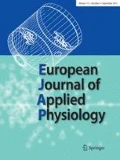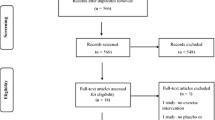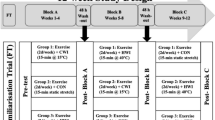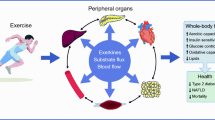Abstract
Aberrant local inflammatory signaling within skeletal muscle is now considered a contributing factor to the development of sarcopenia. Recent evidence indicates that chronic resistance training contributes to the control of locally derived inflammation via adaptations to repeated, acute increases in pro-inflammatory mRNA within muscle. However, only a limited number of gene transcripts related to the inflammatory process have been examined in the literature. The present study utilized an acute bout to examine the effects of resistance exercise on several inflammatory-related genes in 24 physically active, post-menopausal women not currently undergoing hormone replacement therapy. Following a standard warm-up, participants completed a lower-body resistance exercise bout consisting of 3 sets of 10 repetitions on machine squat, leg press, and leg extension exercises (80% intensity). Muscle biopsies were obtained from the vastus lateralis of the dominant leg at baseline and 3 h following exercise. Significant (p < 0.05) up-regulation in mRNA content was observed for TNFα, IL1β, IL6, IL8, SOCS2, COX2, SAA1, SAA2, IKKB, cfos, and junB. Muscle mRNA content was not significantly altered at the 0.05 level for IL2, IL5, IL10, or IL12 (p35). Venous blood samples were also obtained at baseline as well as at 3, 24, and 48 h post-exercise. Serum was analyzed for circulating TNFα, IL1β, IL6, IL8, COX2, and SAA with no significant changes observed. These results indicate that resistance exercise is capable of up-regulating transcription of numerous inflammatory mediators within skeletal muscle, and these appear to be worthy of future examination in chronic studies.




Similar content being viewed by others
References
Akerstrom T, Steensberg A, Keller P, Keller C, Penkowa M, Pedersen BK (2005) Exercise induces interleukin-8 expression in human skeletal muscle. J Physiol 563:507–516
Badolato R, Johnston JA, Wang JM et al (1995) Serum amyloid A induces calcium mobilization and chemotaxis of human monocytes by activating a pertussis toxin-sensitive signaling pathway. J Immunol 155:4004–4010
Bassey EJ, Fiatarone MA, O’Neill EF, Kelly M, Evans WJ, Lipsitz LA (1992) Leg extensor power and functional performance in very old men and women. Clin Sci (Lond) 82:321–327
Bickel CS, Slade J, Mahoney E, Haddad F, Dudley GA, Adams GR (2005) Time course of molecular responses of human skeletal muscle to acute bouts of resistance exercise. J Appl Physiol 98:482–488
Bondesen BA, Mills ST, Kegley KM, Pavlath GK (2004) The COX-2 pathway is essential during early stages of skeletal muscle regeneration. Am J Physiol Cell Physiol 287:C475–C483
Bondesen BA, Mills ST, Pavlath GK (2006) The COX-2 pathway regulates growth of atrophied muscle via multiple mechanisms. Am J Physiol Cell Physiol 290:C1651–C1659
Bruunsgaard H, Bjerregaard E, Schroll M, Pedersen BK (2004) Muscle strength after resistance training is inversely correlated with baseline levels of soluble tumor necrosis factor receptors in the oldest old. J Am Geriatr Soc 52:237–241
Cheng M, Nguyen MH, Fantuzzi G, Koh TJ (2008) Endogenous interferon-{gamma} is required for efficient skeletal muscle regeneration. Am J Physiol Cell Physiol 294:C1183–C1191
Coffey VG, Hawley JA (2007) The molecular bases of training adaptation. Sports Med 37:737–763
Dirks AJ, Leeuwenburgh C (2006) Tumor necrosis factor alpha signaling in skeletal muscle: effects of age and caloric restriction. J Nutr Biochem 17:501–508
Douchi T, Yamamoto S, Nakamura S et al (1998) The effect of menopause on regional and total body lean mass. Maturitas 29:247–252
Durham WJ, Li YP, Gerken E et al (2004) Fatiguing exercise reduces DNA binding activity of NF-kappaB in skeletal muscle nuclei. J Appl Physiol 97:1740–1745
Frontera WR, Hughes VA, Lutz KJ, Evans WJ (1991) A cross-sectional study of muscle strength and mass in 45- to 78-yr-old men and women. J Appl Physiol 71:644–650
Frost RA, Lang CH (2005) Skeletal muscle cytokines: regulation by pathogen-associated molecules and catabolic hormones. Curr Opin Clin Nutr Metab Care 8:255–263
Girasole G, Giuliani N, Modena AB, Passeri G, Pedrazzoni M (1999) Oestrogens prevent the increase of human serum soluble interleukin-6 receptor induced by ovariectomy in vivo and decrease its release in human osteoblastic cells in vitro. Clin Endocrinol (Oxf) 51:801–807
Gower BA, Nyman L (2000) Associations among oral estrogen use, free testosterone concentration, and lean body mass among postmenopausal women. J Clin Endocrinol Metab 85:4476–4480
Greeves JP, Cable NT, Reilly T, Kingsland C (1999) Changes in muscle strength in women following the menopause: a longitudinal assessment of the efficacy of hormone replacement therapy. Clin Sci (Lond) 97:79–84
Greiwe JS, Cheng B, Rubin DC, Yarasheski KE, Semenkovich CF (2001) Resistance exercise decreases skeletal muscle tumor necrosis factor alpha in frail elderly humans. FASEB J 15:475–482
Haddad F, Adams GR (2006) Aging-sensitive cellular and molecular mechanisms associated with skeletal muscle hypertrophy. J Appl Physiol 100:1188–1203
Haddad F, Zaldivar F, Cooper DM, Adams GR (2005) IL-6-induced skeletal muscle atrophy. J Appl Physiol 98:911–917
Hamada K, Vannier E, Sacheck JM, Witsell AL, Roubenoff R (2005) Senescence of human skeletal muscle impairs the local inflammatory cytokine response to acute eccentric exercise. FASEB J 19:264–266
Hayot M, Michaud A, Koechlin C et al (2005) Skeletal muscle microbiopsy: a validation study of a minimally invasive technique. Eur Respir J 25:431–440
Hershkoviz R, Preciado-Patt L, Lider O et al (1997) Extracellular matrix-anchored serum amyloid A preferentially induces mast cell adhesion. Am J Physiol 273:C179–C187
Janssen I, Shepard DS, Katzmarzyk PT, Roubenoff R (2004) The healthcare costs of sarcopenia in the United States. J Am Geriatr Soc 52:80–85
Ji LL, Gomez-Cabrera MC, Steinhafel N, Vina J (2004) Acute exercise activates nuclear factor (NF)-kappaB signaling pathway in rat skeletal muscle. FASEB J 18:1499–1506
Kandarian SC, Jackman RW (2006) Intracellular signaling during skeletal muscle atrophy. Muscle Nerve 33:155–165
Kovacevic A, Hammer A, Stadelmeyer E et al (2008) Expression of serum amyloid A transcripts in human bone tissues, differentiated osteoblast-like stem cells and human osteosarcoma cell lines. J Cell Biochem 103:994–1004
Kramer PR, Kramer SF, Guan G (2004) 17 beta-estradiol regulates cytokine release through modulation of CD16 expression in monocytes and monocyte-derived macrophages. Arthritis Rheum 50:1967–1975
Lambert CP, Wright NR, Finck BN, Villareal DT (2008) Exercise but not diet-induced weight loss decreases skeletal muscle inflammatory gene expression in frail obese elderly persons. J Appl Physiol 105:473–478
Lexell J, Taylor CC, Sjostrom M (1988) What is the cause of the ageing atrophy? total number, size and proportion of different fiber types studied in whole vastus lateralis muscle from 15- to 83-year-old men. J Neurol Sci 84:275–294
Louis E, Raue U, Yang Y, Jemiolo B, Trappe S (2007) Time course of proteolytic, cytokine, and myostatin gene expression after acute exercise in human skeletal muscle. J Appl Physiol 103:1744–1751
Mahoney DJ, Carey K, Fu MH et al (2004) Real-time RT-PCR analysis of housekeeping genes in human skeletal muscle following acute exercise. Physiol Genomics 18:226–231
Manton KG, Gu X (2001) Changes in the prevalence of chronic disability in the United States black and nonblack population above age 65 from 1982 to 1999. Proc Natl Acad Sci USA 98:6354–6359
Melton LJ 3rd, Khosla S, Crowson CS, O’Connor MK, O’Fallon WM, Riggs BL (2000) Epidemiology of sarcopenia. J Am Geriatr Soc 48:625–630
Moore MJ (2005) From birth to death: the complex lives of eukaryotic mRNAs. Science 309:1514–1518
Mourkioti F, Rosenthal N (2005) IGF-1, inflammation and stem cells: interactions during muscle regeneration. Trends Immunol 26:535–542
Pelosi L, Giacinti C, Nardis C et al (2007) Local expression of IGF-1 accelerates muscle regeneration by rapidly modulating inflammatory cytokines and chemokines. FASEB J 21:1393–1402
Phillips SK, Rook KM, Siddle NC, Bruce SA, Woledge RC (1993) Muscle weakness in women occurs at an earlier age than in men, but strength is preserved by hormone replacement therapy. Clin Sci (Lond) 84:95–98
Pilegaard H, Ordway GA, Saltin B, Neufer PD (2000) Transcriptional regulation of gene expression in human skeletal muscle during recovery from exercise. Am J Physiol Endocrinol Metab 279:E806–E814
Plomgaard P, Penkowa M, Pedersen BK (2005) Fiber type specific expression of TNF-alpha, IL-6 and IL-18 in human skeletal muscles. Exerc Immunol Rev 11:53–63
Puntschart A, Wey E, Jostarndt K et al (1998) Expression of fos and jun genes in human skeletal muscle after exercise. Am J Physiol 274:C129–C137
Rannevik G, Jeppsson S, Johnell O, Bjerre B, Laurell-Borulf Y, Svanberg L (2008) A longitudinal study of the perimenopausal transition: altered profiles of steroid and pituitary hormones, SHBG and bone mineral density. Maturitas 61:67–77
Rippy L, Marsden J (2006) Is HRT justified for symptom management in women at higher risk of developing breast cancer? Climacteric 9:404–415
Roubenoff R (2007) Physical activity, inflammation, and muscle loss. Nutr Rev 65:S208–S212
Steensberg A, van Hall G, Osada T, Sacchetti M, Saltin B, Klarlund Pedersen B (2000) Production of interleukin-6 in contracting human skeletal muscles can account for the exercise-induced increase in plasma interleukin-6. J Physiol 529(Pt 1):237–242
Taaffe DR, Luz Villa M, Delay R, Marcus R (1995) Maximal muscle strength of elderly women is not influenced by oestrogen status. Age Ageing 24:329–333
Visser M, Pahor M, Taaffe DR et al (2002) Relationship of interleukin-6 and tumor necrosis factor-alpha with muscle mass and muscle strength in elderly men and women: the Health ABC Study. J Gerontol A Biol Sci Med Sci 57:M326–M332
Willoughby DS (2004) Effects of heavy resistance training on myostatin mRNA and protein expression. Med Sci Sports Exerc 36:574–582
Willoughby DS, Stout JR, Wilborn CD (2007) Effects of resistance training and protein plus amino acid supplementation on muscle anabolism, mass, and strength. Amino Acids 32:467–477
World Health Organization (1981) Research on the menopause. World Health Organ Tech Rep Ser 670:1–120
Yang Y, Creer A, Jemiolo B, Trappe S (2005) Time course of myogenic and metabolic gene expression in response to acute exercise in human skeletal muscle. J Appl Physiol 98:1745–1752
Acknowledgments
The authors wish to thank all participants for their hard work and willingness to follow the study protocol. TB is currently supported by the University of Florida Institute on Aging and Claude D. Pepper Older Americans Independence Center (1 P30 AG028740).
Author information
Authors and Affiliations
Corresponding author
Rights and permissions
About this article
Cite this article
Buford, T.W., Cooke, M.B. & Willoughby, D.S. Resistance exercise-induced changes of inflammatory gene expression within human skeletal muscle. Eur J Appl Physiol 107, 463–471 (2009). https://doi.org/10.1007/s00421-009-1145-z
Accepted:
Published:
Issue Date:
DOI: https://doi.org/10.1007/s00421-009-1145-z




